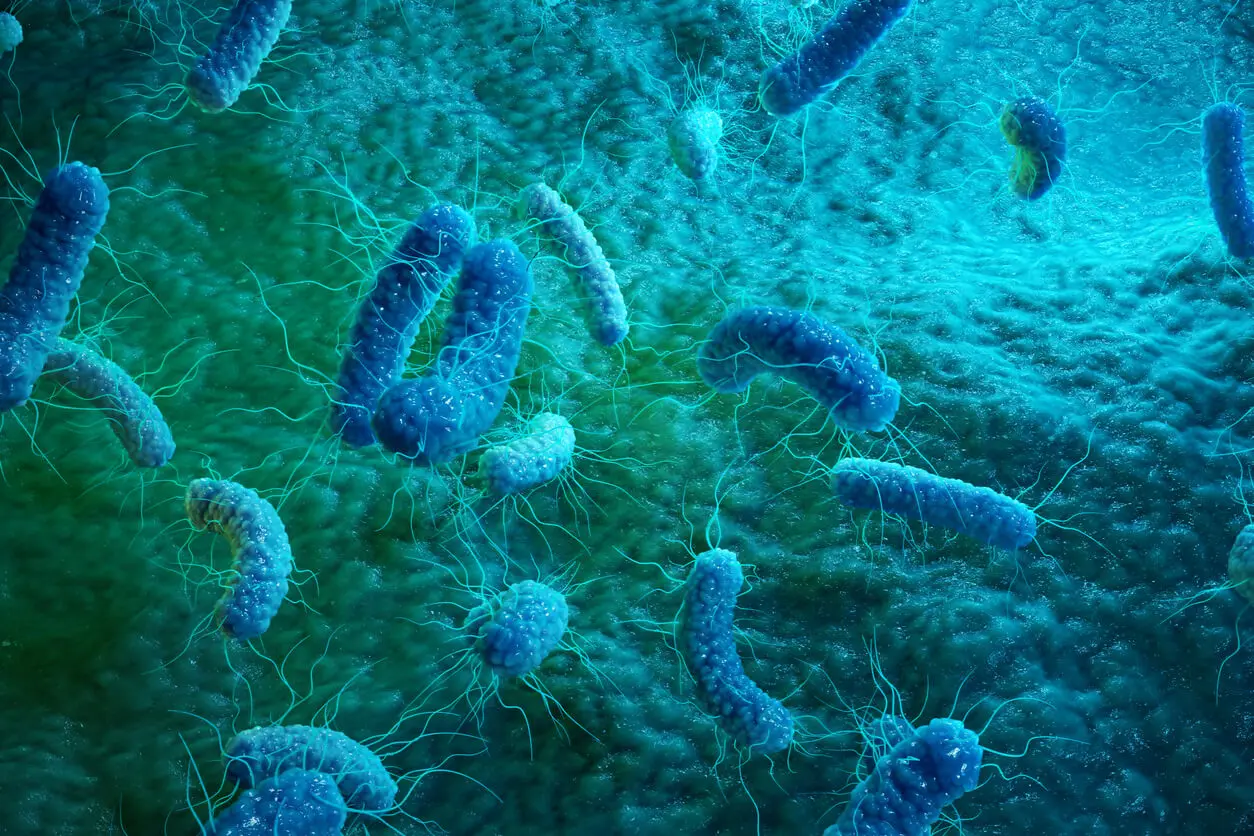Enteritis: What Is It and What Are the Causes, Symptoms, and Treatment?

Diseases of the gastrointestinal system are frequent and high-impact conditions. Enteritis is a disease associated with the consumption of contaminated food, radiotherapy, and the use of certain medications. In this article, we’ll tell you everything you should know about this disease.
When we talk about enteritis, we’re referring to the inflammation of the intestinal loops, especially the small intestine. This is a frequent cause of abdominal discomfort, diarrhea, and vomiting.
It’s usually self-limiting and resolves spontaneously. However, some people may become complicated as a result of dehydration.
There are several conditions associated with the development of enteritis, with infection by viruses or bacteria being the main culprit. Studies estimate a higher incidence in children under five years of age and older adults.
Common symptoms of enteritis
The clinical manifestations of enteritis result from inflammation of the intestinal mucosa. In cases of bacterial or viral infection, symptoms appear within 24 to 72 hours of exposure.
Diarrhea and abdominal pain are the most common symptoms of enteritis. Diarrhea usually comes on suddenly, is severe, and in some people may be accompanied by mucus and blood.
Other manifestations include the following:
- Headaches
- Fever and chills
- Loss of appetite
- Nausea and vomiting
We think you may be interested in reading this, too: How to Make a Cleansing Juice to Empty Your Intestines Naturally
The causes of enteritis
Consumption of food and drink contaminated by viruses or bacteria is the most common cause of enteritis. Inflammation of the small intestine can spread and involve the stomach and large intestine, leading to gastritis and colitis, respectively.
Enteritis is classified according to the causes that give rise to it. In this sense, we can find the following forms of presentation.
1. Bacterial enteritis
Colonization of the small intestine by bacteria usually occurs through the ingestion of contaminated water and milk, undercooked meats, and poorly preserved products. Poor hygiene conditions and unsafe food handling increase the risk of infection.
Studies state that the main bacteria associated with enteritis are Salmonella, Campylobacter jejuni, Shigella, Escherichia coli and Vibrio cholerae.

2. Viral enteritis
Viruses are the main culprits of gastrointestinal infection and diarrhea in children. In most people, the clinical pictures are self-limited and may be complicated in immunocompromised patients.
Research suggests that rotaviruses are the leading cause of severe diarrhea in children under five years of age. Astroviruses, caliciviruses, and enteric adenoviruses are also important etiologic agents of the disease.
Rotavirus vaccination is an important tool for prevention.
3. Radiation enteritis
This form of enteritis is caused by exposure to radiation therapy of the abdomen, pelvis, or rectum. For this reason, it’s more common in people with cancer of the gastrointestinal tract or genitourinary organs.
The inflammation of the bowel disappears within a couple of weeks of the end of treatment. However, in some people, it persists for months or even years. It’s associated with chronic anemia and partial intestinal obstruction, according to studies.
4. Autoimmune enteritis
This form is inflammation of the intestinal mucosa that occurs as a result of abnormal functioning of the immune system (e.g., Crohn’s disease and lupus). Antibodies and white blood cells recognize their own intestinal cells as foreign and attack them, causing the condition.
5. Enteritis due to medication
In some people, this disorder occurs as an adverse effect of taking certain drugs. Non-steroidal anti-inflammatory drugs (NSAIDs) such as ibuprofen and naproxen are examples. Similarly, the consumption of drugs such as cocaine also favors the development of enteritis.
6. Enteritis due to food poisoning
This variant is produced by the action of bacterial toxins on the small intestine tissue. It occurs after ingestion of poorly processed food in poor hygienic conditions. The agents responsible include some strains of Staphylococcus aureus and the O157:H7 strain of E. coli.
Like this article? You may also like to read: The Incredible Physiology of the Large Intestine
Main complications
Dehydration is the main short-term complication in people with enteritis. It occurs due to fluid loss caused by prolonged and persistent diarrhea.
In infants and young children, dehydration is usually more severe and develops more rapidly. For this reason, adequate fluid replacement is essential in these young patients.
How is it diagnosed?
The diagnosis of enteritis is based on clinical manifestations and complementary tests. The physician will perform an adequate interrogation about recent travels, type of feeding, and history of family illness.
In addition, a detailed physical examination will provide valuable data. If bacterial enteritis is suspected, a stool culture may be requested to identify the microorganism responsible. Similarly, if symptoms persist, the professional may request an endoscopic or colonoscopic evaluation of the digestive tract.

Treatment and prognosis
In most cases, enteritis is self-limiting and disappears within a couple of days. Treatment is therefore aimed at relieving symptoms and halting dehydration.
Oral rehydration with commercial preparations is indicated to balance the loss of electrolytes and minerals due to vomiting and diarrhea. In some people with severe dehydration, intravenous fluids are necessary.
Antibiotics may be indicated to eliminate the responsible microorganism or to reduce bacterial overgrowth (in case of radiation enteritis). It’s not advisable to use antidiarrheals without prior medical indication, as they may worsen the condition.
Is it possible to prevent enteritis?
Several measures can be taken to reduce the risk of enteritis due to contaminated food and water. Some of the main recommendations are the following:
- Refrigerate food well.
- Keep vaccination schedule up to date.
- Avoid drinking water of unknown origin.
- Ensure cleanliness of cooking utensils.
- Avoid contact between raw meat and vegetables.
- Cook food properly, especially meat.
- Wash your hands with plenty of soap and water after using the toilet and before eating.
When to seek medical attention
It’s advisable to consult a physician if symptoms persist for more than one week. Similarly, the presence of signs of dehydration, such as pale skin, cold sweat, palpitations, and drowsiness requires a professional approach as soon as possible.
Other warning signs are the appearance of abundant blood in the stool and fever higher than 39 ° C. In any case, health professionals are the only ones qualified to provide the necessary care and prevent life-threatening complications.
A lack of professional follow-up and control could have serious consequences. Therefore, don’t hesitate to consult a medical specialist if you have any concerns about this disease.
All cited sources were thoroughly reviewed by our team to ensure their quality, reliability, currency, and validity. The bibliography of this article was considered reliable and of academic or scientific accuracy.
- Yalda Lucero A. Etiología y manejo de la gastroenteritis aguda infecciosa en niños y adultos. Revista Médica Clínica Las Condes. 2014;25(3):463-472.
- Solano-Iturri G, Rámiz-Martínez M, de la Guerra-Acebal C, García-Jiménez N. Enteritis por radiación (forma diferida crónica). Gaceta Médica de Bilbao. 2010;107(2):68-71.
- Paredes S, Roca J. Infecciones gastrointestinales. Offarm. 2004; 23(5):100-106.
- De Cal I, Mohedano R, Sánchez A. Rotavirus y otros virus productores de gastroenteritis aguda en la infancia. Enfermedades Infecciosas y Microbiología Clínica. 2008; 26(13): 61-65.
- Hale MF. Radiation enteritis: from diagnosis to management. Curr Opin Gastroenterol. 2020 May;36(3):208-214.
- Chigerwe M, Heller MC. Diagnosis and Treatment of Infectious Enteritis in Adult Ruminants. Vet Clin North Am Food Anim Pract. 2018 Mar;34(1):119-131.
This text is provided for informational purposes only and does not replace consultation with a professional. If in doubt, consult your specialist.








